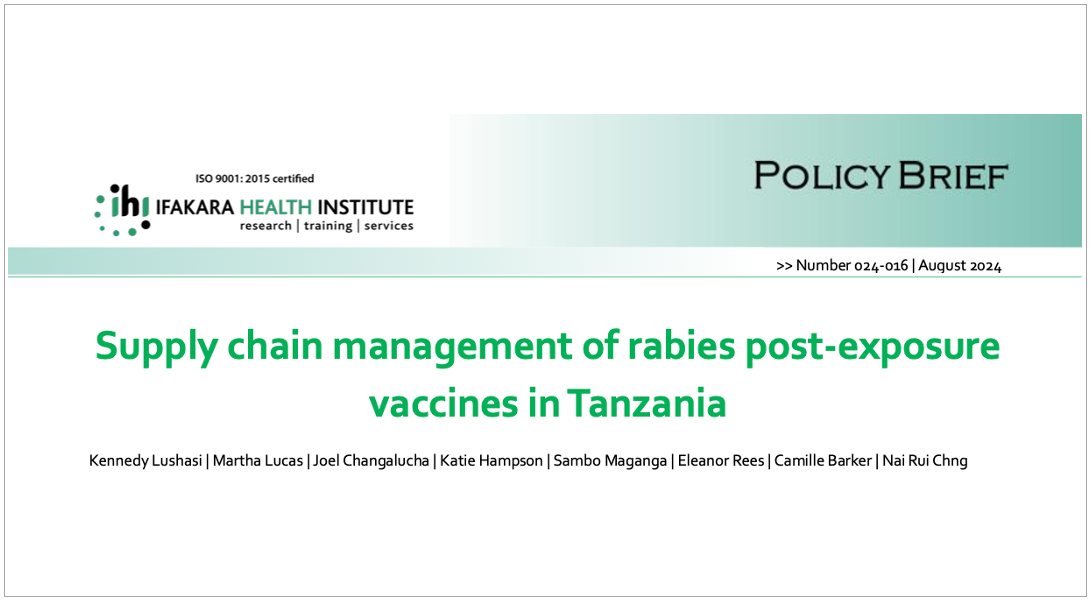
POLICY: Improving rabies vaccine supply in Tanzania

Rabies remains a major health issue in Tanzania, causing around 800 deaths each year. Many of these deaths can be prevented through post-exposure prophylaxis (PEP), but access to this treatment is often hindered by supply and cost issues.
A policy brief by Kennedy Lushasi, Joel Changalucha and colleagues from Ifakara Health Institute and partners highlights strategies to improve vaccine availability, with the goal of saving lives across the country.
Key Challenges in Managing Vaccine Supply
Rabies is mainly transmitted through dog bites, and it is especially dangerous in areas where fewer dogs are vaccinated. The authors identify a key challenge: the demand for rabies vaccines fluctuates. The number of dog bites varies from month to month and across different regions, making it difficult to maintain a consistent vaccine supply. While some regions experience few cases, others can suddenly have many, straining the system. This unpredictability complicates efforts to ensure vaccines are available where needed most.
Maximizing Vaccine Efficiency with the ID Method
The authors show that using the World Health Organization’s intradermal (ID) vaccination method is highly effective. This method uses fewer vaccine vials compared to the traditional intramuscular (IM) method. With ID, healthcare providers can share vials between patients, making it more efficient. For example, in areas like Ulanga, where rabies cases are high, the ID method only requires 250 vials annually, while the IM method needs 650 vials. By using vaccines more efficiently, the ID method helps prevent shortages during sudden increases in demand, ensuring timely vaccinations.
Decentralization: A Double-Edged Sword
Decentralizing vaccine distribution makes vaccines more accessible across multiple locations in a district, benefiting rural populations. However, the authors explain, “While decentralization may enhance access, it leads to higher vaccine consumption” due to fewer patients sharing vials. The authors found that, in districts with many patients, decentralization increased the number of vials required, though it was still more efficient than the traditional IM method.
To achieve the best results, the authors recommend balancing vaccine accessibility with efficient use. This approach requires careful planning, proper storage, and well-trained healthcare workers.
Restocking Strategies to Avoid Shortages
A key recommendation from the authors is to adopt flexible restocking guidelines. By analyzing data from 2018 to 2023, the authors recommend that clinics should monitor their supplies closely and restock before levels get too low. In areas where resupply takes longer, clinics should keep more vaccines on hand and set alerts to restock earlier. These strategies help avoid running out of vaccines, even in remote regions.
A Path Forward for Rabies Control
With support from Gavi, the Vaccine Alliance, Tanzania has a unique opportunity to strengthen its rabies control efforts. The authors note, “With Gavi’s investment in human rabies vaccines, an increase in healthcare-seeking behavior is expected and, subsequently, greater PEP demand.” By combining this investment with strategic supply chain management, Tanzania can significantly reduce rabies deaths.
The authors call for continued monitoring of vaccine demand, improved stock management practices, and adjustments in response to changing conditions. Ultimately, a robust and responsive supply chain will be crucial to ensuring lifesaving rabies vaccines are available to all Tanzanians, regardless of where they live.
The brief is based on rabies research conducted conducted by Kennedy Lushasi, Amina Ismail, Humphrey Mazigo, Katie Hampson, Bernadeta Soka, and Boniface Gamanya from Ifakara Health Institute, with technical support from the University of Glasgow and funding from the Wellcome Trust.
Understanding Rabies
Rabies is a viral disease that affects mammals, including humans, primarily transmitted through the bite of rabid animals, especially dogs. It attacks the central nervous system and can lead to fatal symptoms if untreated. Immediate medical attention, including PEP, is essential after a suspected rabies exposure. It’s estimated that 1,500 people die annually in Tanzania from rabies, a preventable disease through vaccination.
